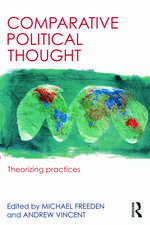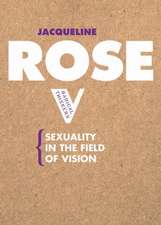Love is a Sweet Chain: Desire, Autonomy and Friendship in Liberal Political Theory
Autor James Martelen Limba Engleză Hardback – 2 iul 2001
| Toate formatele și edițiile | Preț | Express |
|---|---|---|
| Paperback (1) | 90.20 lei 6-8 săpt. | |
| Taylor & Francis – 27 iun 2001 | 90.20 lei 6-8 săpt. | |
| Hardback (1) | 375.50 lei 6-8 săpt. | |
| Taylor & Francis – 2 iul 2001 | 375.50 lei 6-8 săpt. |
Preț: 375.50 lei
Nou
Puncte Express: 563
Preț estimativ în valută:
71.85€ • 78.29$ • 60.55£
71.85€ • 78.29$ • 60.55£
Carte tipărită la comandă
Livrare economică 23 aprilie-07 mai
Preluare comenzi: 021 569.72.76
Specificații
ISBN-13: 9780415928564
ISBN-10: 0415928567
Pagini: 282
Dimensiuni: 152 x 229 x 25 mm
Greutate: 0.59 kg
Ediția:1
Editura: Taylor & Francis
Colecția Routledge
Locul publicării:Oxford, United Kingdom
ISBN-10: 0415928567
Pagini: 282
Dimensiuni: 152 x 229 x 25 mm
Greutate: 0.59 kg
Ediția:1
Editura: Taylor & Francis
Colecția Routledge
Locul publicării:Oxford, United Kingdom
Recenzii
"Love is a Sweet Chain is far more than a rich and compelling reading of Hobbes, Locke, Rousseau, Emerson and Thoreau. A genealogy of love in political theory, a political theory of love, a deconstruction of the antinomy between love and politics, a feminist politics of love, a careful desacralization of love and friendship, and a rethinking of the bonds between citizens and between citizen and state in liberalism---in one short book, Martel breaks ground on all of this virgin territory. Perhaps he has even inaugurated a new domain of inquiry in political theory; fortuitously, it is an inauguration rich in erudition, imagination, and subtlety." -- Wendy Brown, Professor of Political Science, University of California, Berkeley and author of States of Injury
"Love is a Sweet Chain is not only a learned guide to the political theory of love from the Greeks to the present that will be of immense value to historians but also a contribution to thinking about the place of the body in how we understand humanity and mutual obligation. Hobbes ends up the unlikely hero. And, whether we accept Martel's view or not, it is exhilarating to follow, with him, liberalism's road-not-taken as a possible route to a new understanding of respect, responsibility, and inclusion. Not just theorists and historians but anyone who thinks about the nature of community and moral obligation will be provoked and enlightened by this book." -- Thomas W. Laqueur, Professor of History, University of California, Berkeley and author of Making Sex: Body and Gender from the Greeks to Freud
"Love is a Sweet Chain is not only a learned guide to the political theory of love from the Greeks to the present that will be of immense value to historians but also a contribution to thinking about the place of the body in how we understand humanity and mutual obligation. Hobbes ends up the unlikely hero. And, whether we accept Martel's view or not, it is exhilarating to follow, with him, liberalism's road-not-taken as a possible route to a new understanding of respect, responsibility, and inclusion. Not just theorists and historians but anyone who thinks about the nature of community and moral obligation will be provoked and enlightened by this book." -- Thomas W. Laqueur, Professor of History, University of California, Berkeley and author of Making Sex: Body and Gender from the Greeks to Freud
Cuprins
Chapter 1 Introduction; Chapter 2 Locke’s Reasonable Subject; Chapter 3 Jean-Jacques Rousseau; Chapter 4 Emerson’s Celestial Democracy; Chapter 5 Henry David Thoreau; Chapter 6 Thomas Hobbes;













